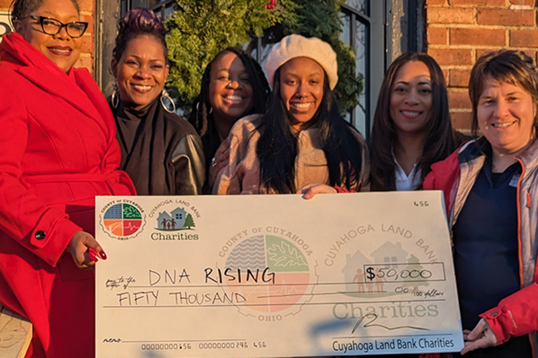LaToya Smith (BBA ’98) never planned to start a nonprofit. But when she saw the crisis firsthand, she—and her friends—stepped in and started changing lives.
One alumna’s fight against housing insecurity
LaToya Smith wishes the nonprofit she helped found wasn’t necessary.
“I wish we didn’t exist,” she says. “I wish everyone already had a home. I wish no child had to sleep in a shelter, and no mom had to beg for a safe place to stay.”
It’s both a powerful and painful truth from the Cleveland State University alumna and co-founder of DNA Rising, an organization fighting Cleveland’s housing crisis by providing long-term support for single mothers and veterans. For Smith, the work is deeply personal—but she dreams of a world where it’s no longer needed.
Until then, she and her co-founders and close friends — Danielle Acosta and Tracie Cleveland —are all in. They built DNA Rising from the ground up during the early days of the COVID-19 pandemic, turning a moment of shared urgency into a movement of lasting impact.

Smith (right) with co-founders Tracie Cleveland (left) and Danielle Acosta (middle)
Their model is bold yet simple: provide bridge housing for up to three years, far longer than the 12-month average offered by most transitional housing programs. That extended time gives families the space to stabilize, rebuild credit, find steady employment, and plan for their futures. So far, DNA Rising has opened two homes and served 15 residents.
The moment that cemented their mission came in the fall of 2022. Their first home had been sitting vacant—initially intended for veterans—when Lutheran Metropolitan Ministry reached out with a referral. A single mom with six kids needed a place to go. DNA Rising welcomed her with open arms.
Smith recalls walking the mother’s nine-year-old daughter through the house. “You get to pick your bedroom,” she told her.
The girl froze. “I get to pick a room?” she asked, in disbelief. Then she hugged Smith and said quietly, “I get to stay here?”
“That broke me,” Smith says. “It reminded me exactly why we’re doing this.”
But DNA Rising is about more than shelter. Residents contribute $100 per month in rent, which is saved and returned to them when they leave. Homes are professionally cleaned and maintained every quarter. Families participate in financial literacy workshops, learn home upkeep, and are required to be enrolled in managed care with a social worker or community health provider.
“Many of these moms have experienced trauma, job loss, discrimination—you name it,” Smith says. “We’re not here to judge. We’re here to walk beside them.”
The organization is run entirely by volunteers. None of the co-founders draw a salary, and they often fund expenses themselves. Challenges—from flooded basements to limited funding—are constant. Still, they press forward.
Their goals for the next five years include expanding into Cleveland’s Buckeye neighborhood, opening a dedicated office and workshop space, and developing a sustainable funding model in partnership with researchers at Case Western Reserve University.
Smith’s hope remains clear: “I want us to become unnecessary. But until then, we’ll be here—giving families a chance to rest, rebuild, and believe again.”





